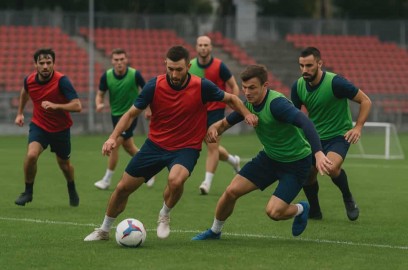
One of the biggest differences between amateur and professional football is the intensity of training. Many players at a lower level can perform technical exercises perfectly well in slow motion or when there is no pressure. However, the real test comes when those same skills must be executed at full speed, under pressure, and with limited time – exactly as it happens in a real match.
Game speed is not just about running faster. It is the ability to think, decide, and act with maximum efficiency in situations identical to match conditions. Mastering this art is what allows a player to make the jump to professional football.
-
WHAT DOES GAME SPEED REALLY MEAN?
-
Executing technical skills at the same speed as in competition.
-
Making decisions within seconds under pressure from opponents.
-
Playing with intensity in every action: passing, pressing, or moving without the ball.
-
Combining technical, physical, and mental sharpness into one.
-
HOW TO TRAIN INTENSITY IN EVERY SESSION
Training without intensity leads to habits that don’t transfer to matches. Every exercise should reflect the tempo of real play.
-
Always train with time pressure (countdowns, limited touches).
-
Increase difficulty by reducing space or adding defenders.
-
Avoid “casual” drills – every repetition should be at game tempo.
-
EXAMPLES OF INTENSITY-BASED DRILLS
-
Rondos under pressure: 5v2 or 6v3, maximum two touches, quick transitions.
-
Small-sided games: 3v3 or 4v4 in tight areas – forces quick decisions and constant movement.
-
High-intensity intervals with the ball: sprints with dribbling or quick combination plays followed by finishing.
-
PHYSICAL DEMANDS – WHY FITNESS MATTERS
Without proper conditioning, a player cannot maintain intensity. Professional football requires repeating sprints, pressing, and recovering at a very high tempo.
-
Interval running and HIIT should be integrated into weekly schedules.
-
Endurance allows players to keep their decision-making sharp even when fatigued.
-
MENTAL SHARPNESS – THINKING AT GAME SPEED
Game speed is also about mental readiness. A professional player processes the game faster:
-
Anticipates the opponent’s move before it happens.
-
Uses scanning (checking surroundings before receiving the ball).
-
Keeps concentration high throughout the session and match.
SUMMARY
Game speed is the key factor that separates amateurs from professionals. It’s not enough to perform skills slowly and without resistance. A player must train at match intensity, under time and space pressure, until every action becomes automatic.
By combining technical drills with physical intensity and mental sharpness, a player develops the ability to play as fast as the game demands – and that is the art of professional football.





